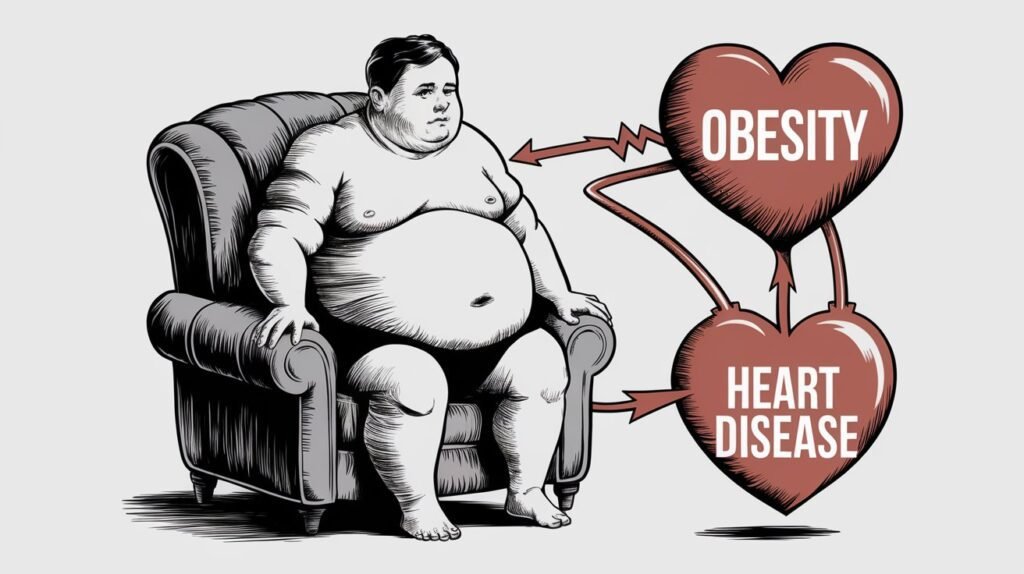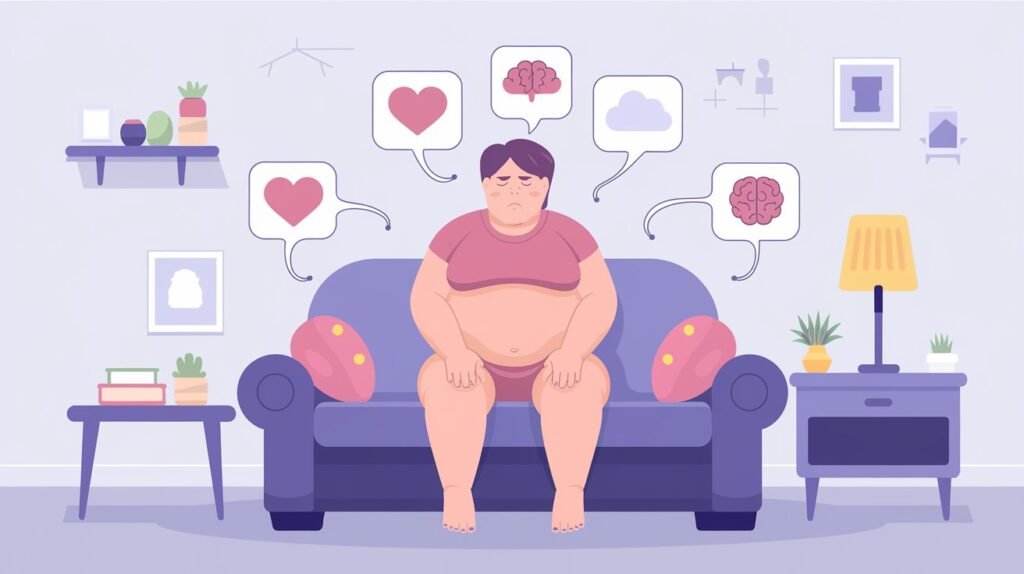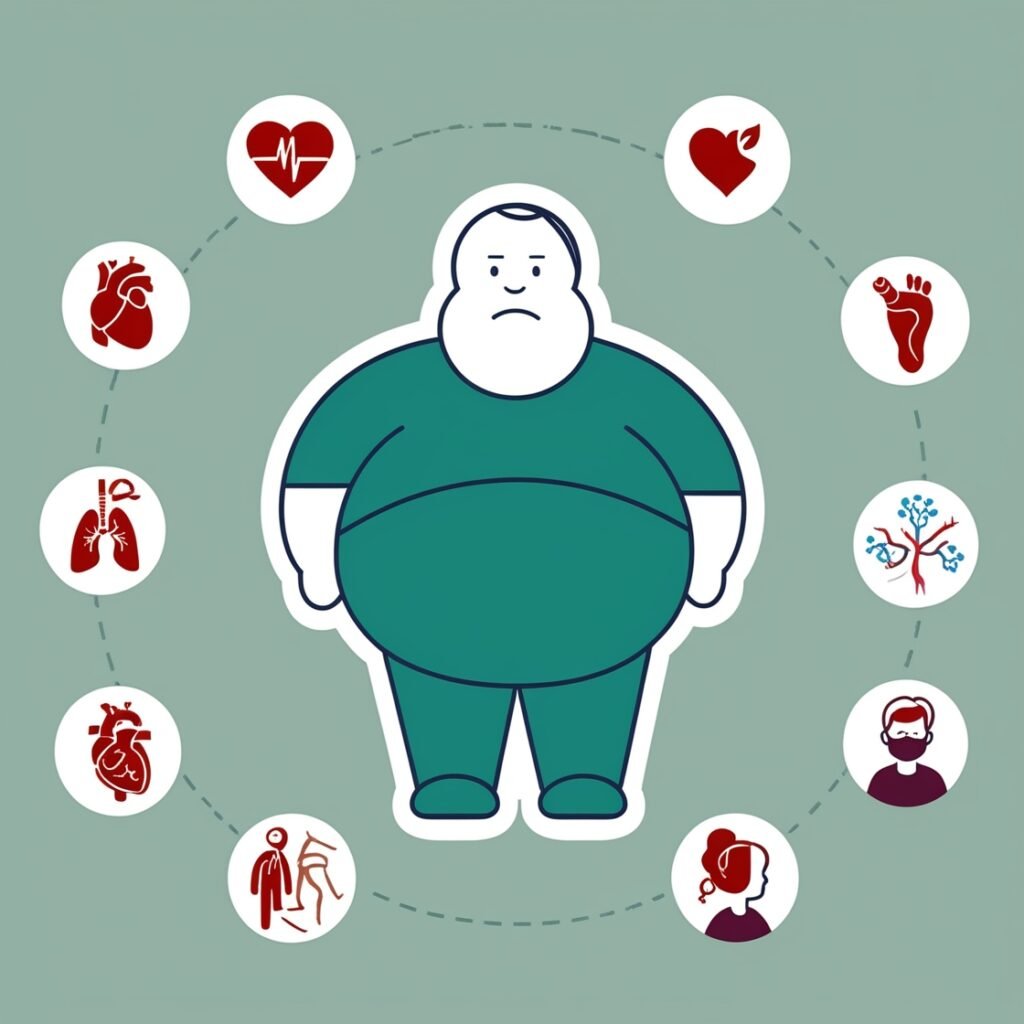Obesity is a global health issue that affects millions of individuals across all age groups. Effects of obesity on health extend far beyond mere physical appearance, leading to numerous health complications. In this article, we will explore the effects of obesity on health, including the physical, mental, and emotional consequences, as well as the importance of addressing this growing concern.
Table of Contents
Introduction to Obesity
Obesity is defined as an abnormal or excessive fat accumulation that presents a risk to health. According to the World Health Organization (WHO), a body mass index (BMI) of 30 or higher indicates obesity. Over the past decades, the prevalence of obesity has skyrocketed, becoming a major public health challenge worldwide.
Obesity Statistics:
- In 2023, it is estimated that over 1.9 billion adults were overweight, with 650 million classified as obese.
- Nearly 39 million children under the age of 5 were affected by overweight or obesity in 2020.
- Obesity-related conditions such as heart disease, stroke, and type 2 diabetes are among the leading causes of preventable death.
What Causes Obesity?
Obesity results from a combination of factors, including:
- Poor Diet: High-calorie, nutrient-poor diets contribute to excessive weight gain.
- Lack of Physical Activity: A sedentary lifestyle is a major contributor to weight gain.
- Genetics: Some individuals may be predisposed to obesity due to their genetic makeup.
- Medical Conditions: Certain diseases like hypothyroidism and medications can lead to weight gain.
Effects of Obesity on Health
Physical Effects of Obesity on Health
The physical effects of obesity on health are profound, affecting nearly every organ system in the body. Below are the major health complications associated with obesity:
Cardiovascular Diseases

Obesity significantly increases the risk of developing cardiovascular diseases (CVDs), such as:
- Hypertension (high blood pressure): Excess body weight forces the heart to work harder to pump blood, leading to higher blood pressure.
- Atherosclerosis: Fat buildup in the arteries can lead to atherosclerosis, restricting blood flow and increasing the risk of heart attacks and strokes.
Statistics:
A 2020 study published in the Journal of the American Heart Association found that individuals with obesity have a 32% higher risk of coronary artery disease compared to those with normal weight.
Type 2 Diabetes
One of the most common and serious consequences of obesity is the development of type 2 diabetes. Excess fat, particularly around the abdomen, increases the body’s resistance to insulin, which is vital for regulating blood sugar levels.
Statistics:
According to the Centers for Disease Control and Prevention (CDC), 90–95% of people with type 2 diabetes are either overweight or obese.
Respiratory Issues
Obesity can compromise lung function and contribute to respiratory problems, including:
- Sleep Apnea: A condition in which breathing repeatedly stops and starts during sleep. It is more prevalent in individuals with obesity due to fat deposits around the upper airway.
- Asthma: Obesity is linked to increased inflammation in the respiratory system, which can exacerbate asthma symptoms.
Joint Problems
Carrying excess weight places additional stress on the joints, especially in the knees, hips, and spine, leading to conditions such as:
- Osteoarthritis: A degenerative joint disease that worsens over time due to the pressure exerted on the joints by excess weight.
Table 1: Impact of Obesity on Joint Health
| Joint Affected | Health Effect | Description |
|---|---|---|
| Knees | Osteoarthritis | Wear and tear of cartilage, causing pain and reduced mobility. |
| Hips | Joint Pain | Inflammation and discomfort due to excess weight. |
| Spine | Disc Problems | Obesity can lead to spinal misalignment and disc herniation. |
Cancer Risk
Several cancers are linked to obesity due to chronic inflammation and hormonal imbalances caused by excess fat. These include:
- Breast cancer (in postmenopausal women)
- Colon cancer
- Endometrial cancer
- Kidney cancer
Mental Effects of Obesity on Health
The mental effects of obesity on health also are profound.

Depression
There is a well-established link between obesity and depression. Feelings of body dissatisfaction, social stigma, and the frustration of trying to lose weight can lead to depressive symptoms.
Statistics:
Research shows that individuals with obesity are up to 55% more likely to develop depression than those with a healthy weight.
Anxiety
Obesity can also contribute to anxiety due to factors like low self-esteem, bullying, and social isolation. The fear of being judged for one’s weight can exacerbate anxiety symptoms.
Low Self-Esteem
People who struggle with obesity often face body image issues and negative societal perceptions, leading to reduced confidence and self-worth.
Social and Emotional Effects of Obesity on Health
Beyond mental health, there are other effects of obesity on health. Obesity has a negative impact on social life and relationships. Individuals may experience:
- Social Isolation: Obesity can limit participation in activities, leading to isolation.
- Discrimination: Weight bias is a real issue that many individuals with obesity face in both professional and personal settings.
- Emotional Eating: The stress and emotional turmoil associated with obesity can lead to overeating as a coping mechanism.
Long-Term Consequences of Childhood Obesity
The effects of obesity on health secondary to childhood obesity are long-lasting and increase the risk of chronic diseases in adulthood. Children with obesity are more likely to remain obese as adults, making them more susceptible to conditions such as:
- Heart disease
- Type 2 diabetes
- Asthma
- Sleep apnea
Statistics:
According to the American Heart Association (AHA), nearly 70% of obese adolescents will become obese adults.
Effects of Obesity on Health: Prevention and Treatment
Preventing and managing obesity is crucial for reducing its adverse effects on health. A comprehensive approach includes making lifestyle changes, adopting healthier habits, and seeking medical interventions when necessary. Below are some effective prevention and treatment methods:

Dietary Changes
One of the most fundamental steps in preventing and treating obesity is making healthier dietary choices. Opting for nutrient-dense foods, including fruits, vegetables, whole grains, lean proteins, and healthy fats, is essential. Reducing the intake of processed foods, sugary drinks, and snacks high in fat and sugar can help prevent excessive calorie consumption.
Tips for dietary changes:
- Portion Control: Learning to manage portion sizes can significantly reduce calorie intake.
- Mindful Eating: Being mindful of hunger and fullness cues can prevent overeating.
- Meal Planning: Planning meals in advance can reduce the temptation to eat unhealthy foods and help maintain a balanced diet.
Studies show that people who make gradual and sustainable dietary changes are more likely to maintain weight loss over time than those who follow restrictive diets that are hard to maintain.
Exercise
Physical activity plays a crucial role in both preventing and treating obesity. Regular exercise helps burn calories, build muscle mass, and improve overall fitness. Engaging in at least 150 minutes of moderate-intensity exercise or 75 minutes of vigorous-intensity exercise per week is recommended for weight management and overall health improvement.
Types of Exercises for Weight Loss
- Cardiovascular Exercise: Activities like running, swimming, cycling, and brisk walking increase heart rate and burn calories.
- Strength Training: Lifting weights or using resistance bands helps build muscle, which in turn burns more calories even at rest.
- High-Intensity Interval Training (HIIT): Short bursts of intense activity followed by brief rest periods can burn a significant amount of calories in a shorter time frame.
Additionally, incorporating more movement into daily activities, such as walking or taking the stairs, can contribute to weight control.
Behavioral Therapy
Behavioral therapy is an effective treatment approach that addresses the emotional and psychological factors contributing to obesity. Many people struggle with emotional eating, stress, and lack of motivation, which can hinder weight loss efforts. Cognitive-behavioral therapy (CBT) helps individuals identify and change unhealthy eating patterns and develop better coping mechanisms for stress and emotional challenges.
Components of Behavioral Therapy for Obesity:
- Self-monitoring: Keeping track of food intake, physical activity, and emotional triggers through journaling or mobile apps.
- Goal Setting: Setting realistic and achievable weight loss goals that are broken into smaller, manageable milestones.
- Problem-Solving: Learning strategies to overcome barriers such as cravings, boredom eating, or social situations that may lead to overeating.
Sleep and Stress Management
Poor sleep and chronic stress are both linked to weight gain and obesity. Lack of sleep affects hunger hormones, increasing appetite and cravings for high-calorie foods. Chronic stress triggers the release of cortisol, a hormone that promotes fat storage, particularly in the abdominal area.
Strategies for Better Sleep and Stress Management:
- Establish a Regular Sleep Schedule: Going to bed and waking up at the same time each day helps regulate the body’s internal clock and improves sleep quality.
- Mindfulness and Relaxation Techniques: Practices such as meditation, yoga, and deep breathing exercises can help reduce stress levels.
- Limit Screen Time Before Bed: Reducing exposure to blue light from phones, tablets, and computers before bedtime can improve sleep quality.
Medical Interventions
In some cases, lifestyle changes alone may not be sufficient for treating obesity, particularly in individuals with severe obesity or obesity-related complications. Medical interventions can be considered, including prescription medications and bariatric surgery.
Weight-Loss Medications
Medications may be prescribed for individuals with a BMI of 30 or higher, or 27 or higher, with obesity-related conditions such as diabetes or hypertension. These medications work by suppressing appetite, increasing feelings of fullness, or reducing the absorption of fat.
Bariatric Surgery
For those with severe obesity (BMI over 40 or over 35 with health complications), bariatric surgery may be an option. Surgical procedures such as gastric bypass, sleeve gastrectomy, and laparoscopic adjustable gastric banding reduce the size of the stomach or alter the digestive process, helping individuals lose significant amounts of weight. While bariatric surgery can be life-changing, it requires lifelong dietary and lifestyle adjustments.
Statistics:
A 2021 study published in The Lancet found that individuals who undergo bariatric surgery can achieve and maintain a 20-30% reduction in body weight over 10 years.
Support Systems and Accountability
The role of support systems in obesity prevention and treatment cannot be underestimated. Having a network of family, friends, or professional support groups can improve adherence to lifestyle changes and increase motivation. Weight loss support groups, whether online or in-person, offer a platform for sharing experiences, tips, and encouragement.
Accountability is also key to long-term success. Regular check-ins with a healthcare provider, dietitian, or personal trainer can help individuals stay on track with their goals. Additionally, using tools such as fitness trackers or food-logging apps can provide daily feedback and reinforcement.
Prevention and treatment of obesity require a comprehensive, individualized approach. Whether through lifestyle changes, therapy, or medical intervention, the key is to make sustainable changes that support long-term health and well-being.
Effects of Obesity on Health: The Conclusion
The effects of obesity on health are far-reaching and can lead to life-threatening conditions if not addressed. The physical, mental, and emotional effects of obesity on health underscore the importance of prevention and treatment. By making lifestyle changes, seeking support, and prioritizing health, individuals can reduce the risks associated with obesity and lead healthier, more fulfilling lives.
References
- World Health Organization. (2023). Obesity and Overweight Facts.
- Centers for Disease Control and Prevention. (2023). The health effects of overweight and obesity.
- American Heart Association. (2020). Obesity and cardiovascular disease. Journal of the American Heart Association, 9(21), 1525-1533.




